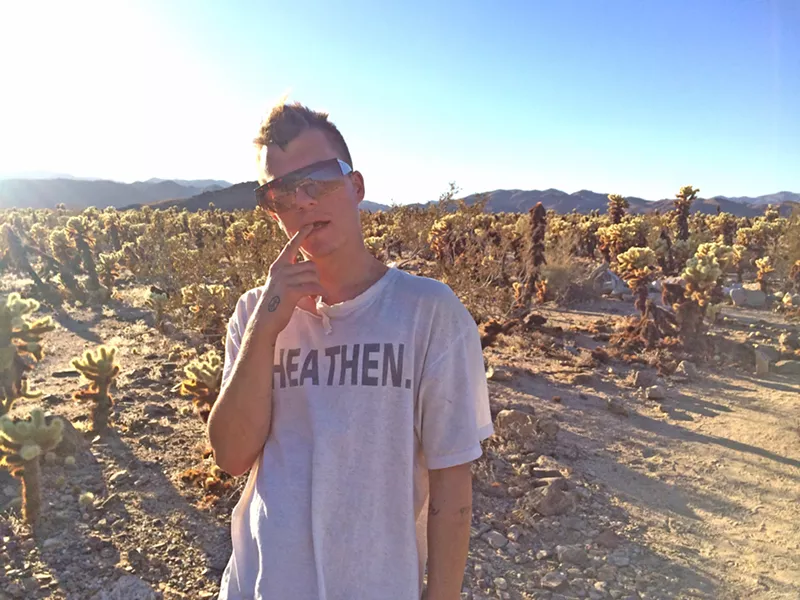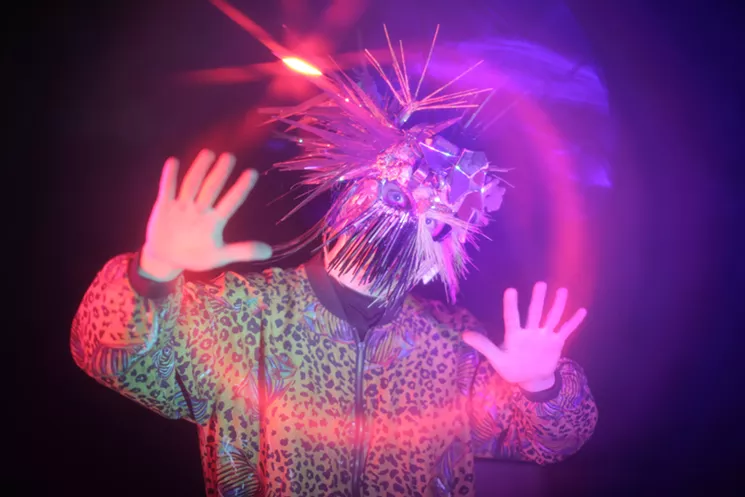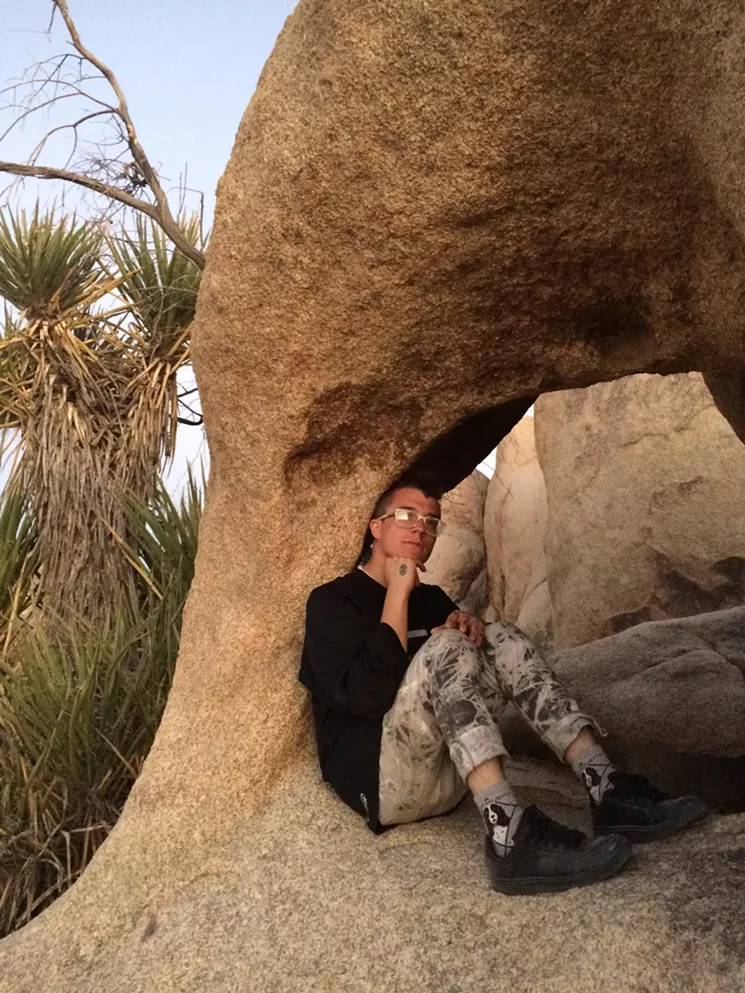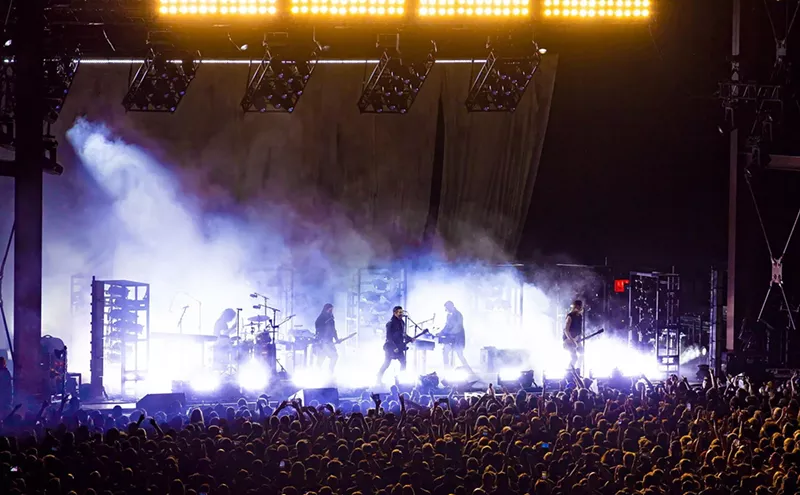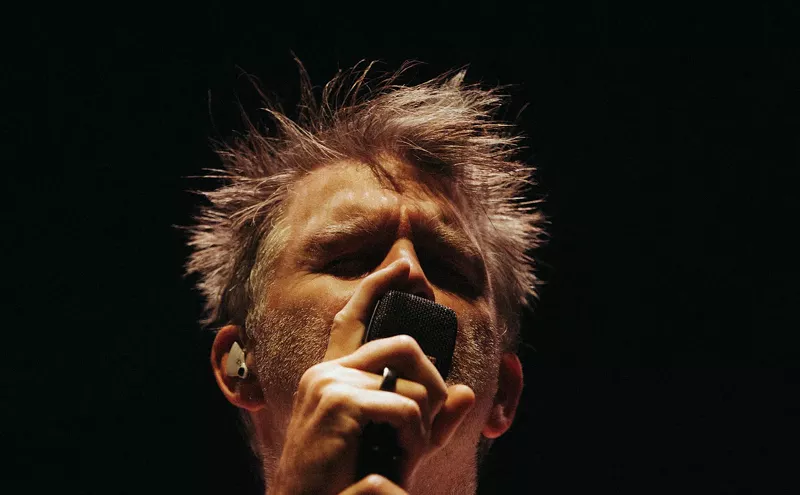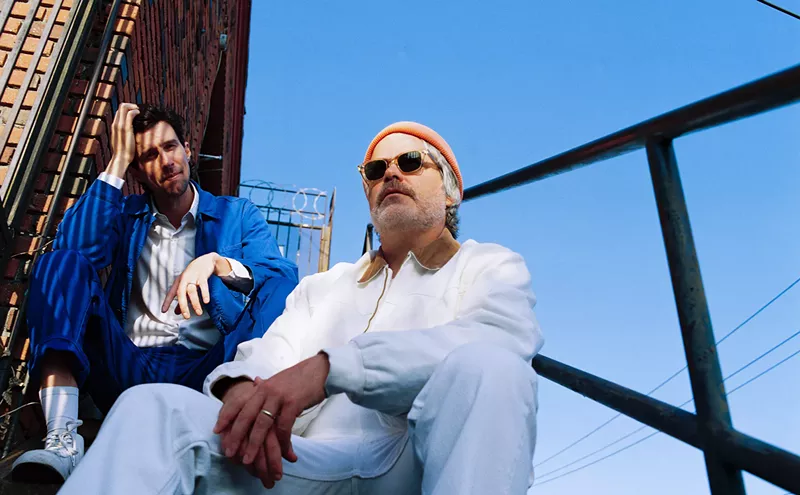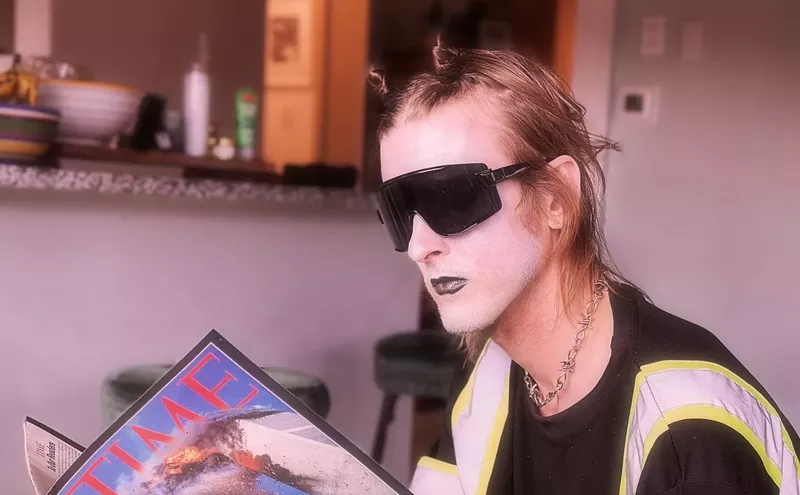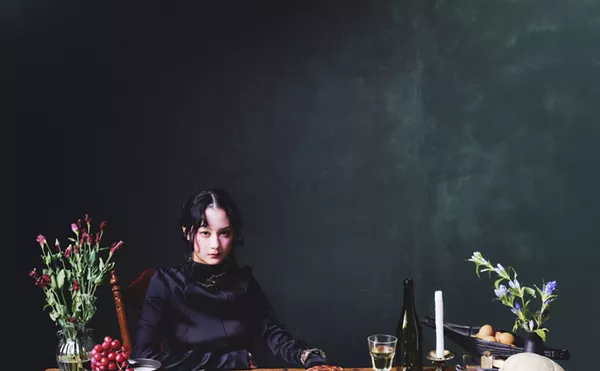"I was talking to this tree. I was like, who's your favorite actor? Spruce Willis."
"I'm tired of the everyday routine. I'm tired of the everyday routine."
Colin Ward delivers these lines in the short video "Tired of the Everyday Routine," one of hundreds of online documentations of the multimedia artist's creative work. This one points to one of Ward's most endearing traits: finding humor in mundane reality.
Ward was funny, but also sincere; his friends describe him as "magic."
Tired Of The Everyday Routine from Stephan Herrera on Vimeo.Ward died on February 1, at the age of 27, a beloved son, a best friend, a poet, an infinite riffer, a living Nickelodeon TV show, an Arthur Russell-meets-Basquiat-meets-Pokémon character, a 16th Street Mall busker, a favorite bandmate, a political hero, a DIY advocate, a supreme creative collaborator, a soulmate. He inspired many of us who were more than a decade older than him, while legions of young art weirdos followed him in a parade of gratitude.
"What Colin did for me was that he saw something in me that I never saw in myself and was able to drag it out and maximize my potential; I think we did that for each other," says Stephan Herrera, a Denver artist, musician and animator who was also Ward's creative collaborator, close friend and the filmmaker behind "Tired of the Everyday Routine."
"Colin lived and loved so fully and deeply. And his capacity for describing through symbols and poetry — the way he felt and what he saw in people — was so comprehensive and just kind of mind-expanding," Herrera says. "The language we had with each other is really near and dear to my heart."
Ward produced close to a hundred full albums of music, created compositions for theater and soundtracks for films, painted every surface imaginable, performed as the voice of a drug-addled cartoon cookie in the animated series Tha Mayoreo Show and performed at hundreds of concerts, sometimes as an electric-synthesizer wizard and other times playing his street-percussion drum kit made from buckets, pots, pans and random objects.
Most of all, Ward was a marvelous architect of immersive experiences — not just in art installations, but in the life he created. He treated trash as magic, drew nature-inspired sketches of an eco-friendly dreamworld he hoped to one day build, and left volumes of deeply personal friend-love notes sent via text messages, Facebook posts, voicemails and videos.
His friends remember him as a "super-special glittery hyperactive angel from space," someone with "incomprehensible output and a fantastical imagination" who practiced "radical inclusivity and generosity." He was seen as a "magical and powerful" presence with the ability to "transform lives and spaces."
"Even while he was still physically with us, Colin had a reputation of being larger than life," says Ryan McRyhew, a longtime friend and musician who performs as Entrancer and toured with Ward. "He just existed on another frequency. But he was also very human. Very sweet, funny, kind, smart as hell, shy, fragile.
"Sometimes it felt like Colin didn't exist in this world, like he was just so magical and so powerful that when he was around, it was us that existed in his world," McRyhew adds. "He transformed lives and spaces."
Other people's trash was the foundation of Ward's art. He saw beauty in debris. Colin was easy to worship: Everything he touched was art, and every word he spoke was poetic. But he also struggled with depression, abused drugs and caused pain in his friends' lives, too, whether it was when his phone went missing and nobody could find him or when he would hurt himself, unable to see the light in himself that his friends saw.
"I've never met anyone more empathic than him. He just picked up on people's anxiety so easily; it was kind of eerie. He just took so much of it in," says filmmaker Kim Shively, Ward's girlfriend.
Shively spent the last few years chronicling Ward's life along with that of Rhinoceropolis, the legendary DIY venue that was home until he and the artists living there were evicted by the City of Denver. That space, mired in the logistics of coming up to code, has yet to reopen.
Ward loved Rhinoceropolis's garbage-art aesthetic; the space reflected his warmth and was adorned with his artworks. Prior to moving into the warehouse in 2012, Ward had performed there dozens of times.
Over the eleven years it operated, Rhinoceropolis had dozens of tenants; many became Ward's collaborators. As a teenager, Ward would be dropped off by his mother, Reverend Jane Anne Ferguson, to play and see shows at the venue; she also let him host shows and art openings in her basement in southeast Denver, in a space he called the Nest.
Ward's need to create began at an early age, and his parents were quick to see and support it. Ferguson recalls allowing her son to draw on the walls of his childhood home in Connecticut, where he spent his early years. His first foray into music was in elementary school, playing clarinet. According to his older brother, Dylan Ward, a producer and director (and later, one of Ward's many collaborators), Colin hated clarinet — and "we hated hearing him play it," Dylan says with a laugh.
When Colin started playing drums, he became truly happy. After high school, he moved to Seattle for a year to be near Dylan and attempt college. He tried school again later, after returning to Denver, but he found himself bored by it all.
Whether in his academic, professional or creative life, Ward worked with sound. He made money on the street busking, he took audio-engineering classes in school, learned marimba and taught himself various sound-production software programs.
In Seattle, he made some of his first recordings under the name Alphabets. The Alphabets Bandcamp page is an archive of just some of Colin's sonic soundscapes recorded between 2008 and 2013 — 47 albums in total.
In his mom's basement, his early musical endeavors — like his emo outfit Pocket Dove, which included a revolving cast of musicians, and Tudaloos, a duo with his friend Nick Peelor— thrived. His bands and solo projects played at DIY venues like Monkey Mania, Le Crunk and Hobo Dojo, where he found an accepting crowd.
Before moving to Rhinoceropolis, he and Herrera lived in a house in Denver's Lincoln Park neighborhood, where they threw shows and art openings, starting in the winter of 2010. At first they had roommates, but "there was something about me and Colin's connection that immediately alienated all of our roommates," Herrera says. "The studio was in the basement, and we would always be making loud music and accumulating trash and art and paintings."
Ward would go on to create that same welcoming all-ages space for other young people when he moved into Rhinoceropolis, opening the door to up-and-coming musicians. "He felt [the DIY community] taught him how to be human, in a way — it taught him how to be in relationships and how to deal with all different kinds of people," says Shively. "And you know, just being surrounded by people all the time was what he wanted."
As an adult, Ward produced dozens of albums and performed hundreds of shows under monikers like Snake Feathers, Chamber Joy, phonebooks, Bangplay and many more. His last solo incarnation, Killd By (once known as Killd By Tha Groove or KBTG or Dj POoLsiDe) produced the 2016 album Recovery. Herrera describes Recovery as Ward's "crowning achievement, a record I feel is still misunderstood."
"It's strange," Herrera adds. "He really reinvented his sound and his music to have this new feeling and depth of emotion."
Shapeshifter - Killd By from Kim Shively on Vimeo.
Since the closing of Rhinoceropolis, the artist-residents — like many people in Denver — have been working to find stable, affordable housing. In recent months, Ward and Shively had been creating a new space in Aurora called Animal Shelter. While it wasn't a home, it was a venue where people communed around art. Earlier this month, Ward and Shively threw a show there, and many friends who had been displaced resurfaced.
In recent weeks, Ward had been composing new work with good friends Laura Conway and her partner, Ben Donehower. Their band, Preeteen O.D., had long been a project that Ward admired, and the two were excited to start creating fresh material with him. The day he died, they set up a xylophone in their living room, ready for him to play it. Ward never showed up.
In retrospect, it's hard not to find traces of death in Ward's work. Late last year, he released a video for "Shapeshifter," a collaboration with Shively. Natural landscapes clash with the sterile environment of a Best Buy, as human-emoji characters wander through crisply shot frames; the video is set to Ward's hyper beats. Part of "Shapeshifter" was shot in a mausoleum, an embodiment of Ward's self-described "Doom Posi" aesthetic and, in hindsight, a foray into the mourning that his friends and collaborators have been experiencing since his passing.
Even the three episodes of Tha Mayoreo Show — possibly Ward and Herrera's greatest joint masterpiece — take on a new tone; the animated shorts are bleak snapshots of fictional cookie Mayoreo's constant face-off with death.
"When Colin was younger, he told me he knew he was going to die at 27," says Herrera. "I don't think he was planning it, but he just kind of knew it. I'm glad that me and him have already kind of faced such hardship and such highs, because I feel like it has equipped me to deal with this. I feel like I have the equipment to make it through this and not let it destroy me as well, even though I feel like I lost my other half."
Herrera says death was not a constant theme for Ward, but something he was willing to confront — something they talked about from the very beginning of their friendship.
"I think of him as someone who was always facing death in the eye," says Herrera. "He was the ultimate risk- taker and had no fear, and was completely relentless with his art practice."
A Service of Remembrance for Colin Ward will be held from 3 to 5 p.m. Saturday, February 10, at Parkview Congregational Church of Christ, 12444 East Parkview Drive in Aurora. More information about memorial events for Colin Ward can be found online.

